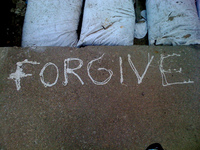 Today’s virtue is embodied in the word "good." The near enemy to good is a word that holds a lot of overt forms of behavioral control. The near enemy to good is “nice.” When assertiveness comes up in class, it is an excellent time to go over the difference between good and nice. Good allows for authenticity while the term nice comes with a whole set of rules and expectations. Nice puts limitations on what you’re allowed to say or even when you're allowed to say it. It says it’s better to just go along to get along and to act differently on the outside than what you feel on the inside. Today’s near enemy lesson is about how to know when something is a tool vs. a crutch. A tool is something you use from a point of strength while a crutch keeps you weak over the long term. This shows up a lot in every aspect of my work but it shows up the most when I’m doing teacher training classes.
 "Let there be spaces in your togetherness, And let the winds of the heavens dance between you." - Kahlil Gibran Like many things in our culture, we want to see things as either all or nothing. The same is true of today's choice in near enemies. The virtue being highlighted is reliance and the state frequently confused with this virtue is codependence. 
Compassion (n.) - Compassion is being able to put yourself in the shoes of the other person. It says that you are not separate, that the other person is you. Compassion links the suffering in the person across from you directly to your own suffering. It is a link and a bond. It brings people closer together as equals and does not shove them apart or put one person above another.
Pity (n.) - Pity says that you acknowledge another person's pain but you still feel separate. With pity, you cannot see how your own suffering is linked to the suffering in the other person. The other person seems unfortunate and separate. Pity puts one person above another.  Today's exploration of near enemies is a tough one for most people. We may acknowledge that mentor and parent are two distinctly different things but many mentors' behavior tells a different tale. The difficulty lies in the hierarchical nature of the relationship. A mentor is there to guide and to teach the apprentice the skills they need to learn to succeed. A parent also does these things but the parent role comes from a much different place and has a much greater responsibility.  Forgiving and letting go of the ways others have hurt you is difficult work. And the difficulty often begins with the word, "Forgiveness." Forgiveness for many people holds an additional connotation of justifying and excusing someone's behavior. This misperception can lead people to hold onto things for longer than they should. Forgiveness is a virtue. Justification is not. Forgiving someone and justifying their behavior are two separate things that only sound similar. |
My Writing and Other Resources for StudentsA growing collection of writing and other resources for students to use to continue their growth.
|

 RSS Feed
RSS Feed